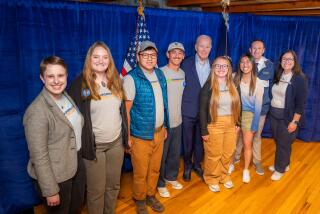Biosphere Candidates Young, Idealistic, Motivated
- Share via
Meeting the 13 candidates who want to spend two years inside Biosphere II is something like stepping into a commune filled with 1960s liberals.
Members of the close-knit group tend to be young, well traveled, highly motivated and idealistic. In interviews, they expressed strong views about the need to protect and nurture the environment.
Before joining Space Biospheres Ventures, most were involved in other ecology-oriented projects operated by the London-based Institute of Ecotechnics, which conceived and manages Biosphere II. Typical of the institute’s projects are efforts to reverse desertification in Africa and to develop farming techniques for arid regions like those in the Mideast.
Variety of Specialties
Many of the “Biospherian candidates” are biologists. Some are computer experts. One is a specialist in space medicine. All are working in more than one scientific discipline to try to improve their chances of being selected.
Only eight will be selected. For now, no selection criteria have been developed, insisted project director Margaret Augustine, who is to choose from the 13. “We’ve been deliberately playing it a bit loose,” she said.
Among the questions that Augustine must consider are the “proper” mix of males and females, whether to choose only single people or to include some married couples, and the appropriate cross section of scientific disciplines.
Some typical candidates:
Kathleen Dyhr, 37, is director of information services for Space Biospheres. A University of Minnesota graduate with a degree in nutrition and social work, she was director of a halfway house for ex-convicts in Minneapolis for five years.
Working for a private foundation, Dyhr has also spent five years training village health workers in Nigeria and Kenya, where she first became interested in ecology. “What good did it do to teach them what foods to eat,” she asks, “if their topsoil is washed away and they can’t grow anything?”
Since 1980, she has worked on Institute of Ecotechnics projects in London, France and New Mexico. She is a chain smoker who thinks the hardest thing about entering Biosphere II will be giving up her cigarettes.
Linda Leigh, 35, got a bachelor’s degree in botany and ecology from Evergreen State College in Olympia, Wash., and did graduate work at the Universities of Wisconsin and Arizona.
She has conducted floral surveys in Alaska and vegetation and wildlife surveys in Olympic National Park for the U.S. Park Service. She has spent the last eight years in the Sonora Desert in Arizona as a consultant to such groups as the Nature Conservancy and the Sonora Desert Museum.
Because she thought that tissue culturing might be a way to preserve endangered plants, she contacted Stephen Storm, director of the tissue culture laboratory at Space Biospheres, and began working there on weekends. Eventually, she asked to join the project.
Storm, 43, describes himself as “a farm kid from south Texas” who spent the early years of his life working in factories in Los Angeles until he developed a renewed interest in farming. After stints at a cattle station in Australia and managing a small agricultural farm in France, he ended up back at a plantation in Australia.
‘Learn Something About It’
There, he recalled, “we wanted to start growing dates but we couldn’t bring in plants because of quarantine rules. We could only bring them in as tissue cultures, so I decided to learn something about it.”
Rather than go to school, however, he spent a year at a commercial laboratory in Florida learning the basic techniques of tissue culturing. He also spent time at UC Riverside and Fairchild Tropical Gardens in Florida.
“When I decided my education was about as good as could be had, I got in touch with Space Biospheres,” he said.
Storm said he wants to be a Biospherian “for the same reasons that I would have wanted to sail around the world with Magellan. . . . It’s one of the greatest things humanity has ever done, and I wouldn’t want to be anywhere else.”
More to Read
Sign up for Essential California
The most important California stories and recommendations in your inbox every morning.
You may occasionally receive promotional content from the Los Angeles Times.












